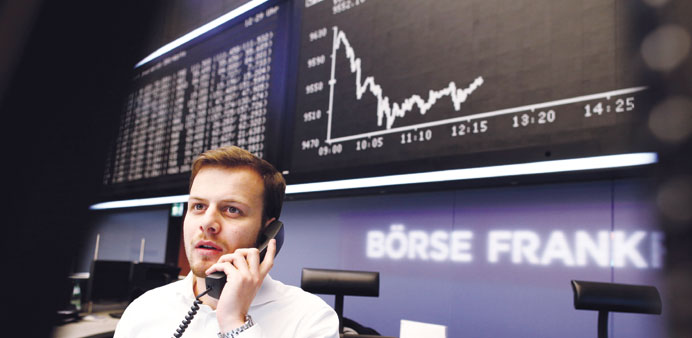A trader speaks on telephone at the Frankfurt Stock Exchange. The DAX 30 lost 0.58% to close at 9,544.19 points yesterday.
European stock markets closed lower yesterday, shrugging off strong eurozone data as concerns about the Chinese economy prompted traders to take profits after a three-day winning streak.
The euro also got a boost against the dollar and British pound after a raft of upbeat news about the bloc’s economic recovery.
London’s FTSE 100 fell 0.11% compared to Tuesday’s closing level to reach 6,674.74 points.
Germany’s DAX 30 lost 0.58% to close at 9,544.19 points while the CAC-40 in Paris dropped 0.74% to 4,451.08 points.
“European equities are out of favour with market participants, who prefer the comfort of safe-haven core government bonds with UK gilts and German bunds seeing flow,” said Ishaq Siddiqi at ETX Capital.
Official European Union data showed the average eurozone government deficit—the shortfall between revenue and spending—was 3.0% of output last year, in line with the EU ceiling and down from 3.7% in 2012.
This, together with a strong eurozone purchasing managers index (PMI), was the latest indicator that the single-currency area is pulling well away from its debt crisis.
Meanwhile France, seen to be a laggard in the process of reform to cut the public deficit and raise competitiveness, promised measures to correct public finances and boost growth and jobs.
And Portugal breezed through a key bond market test, enjoying sharply lower borrowing costs in its first regular auction in three years weeks before it exits a 78bn-euro, three-year rescue programme on May 17.
Still the upbeat news wasn’t enough to sustain European shares, which broke a three-day winning streak to close lower after data showed China’s manufacturing contracted for the fourth straight month.
“The successful auction of Portuguese 10-year debt... like the PMI readings, has been brushed off, with investors potentially paying more attention to the HSBC manufacturing reading for China,” said Craig Erlam, market analyst at traders Alpari.
A closely watched survey revealed that eurozone business activity hit a near three-year high in April as a modest economic recovery gained momentum and began creating much-needed jobs.
Markit Economics said its Eurozone Composite Purchasing Managers Index for April, a leading indicator of overall economic activity, jumped to 54 points from 53.1 in March, the highest reading since May 2011. Anything above 50 indicates growth.
The news drove up the euro, singled out by France as a key drag on its economy, raising pressure on the European Central Bank to intervene.
“Markets are still expecting a big bazooka Fed style (easing) programme by the ECB,” said Siddiqi.
In foreign exchange deals on Wednesday, the euro rose to $1.3836 from $1.3804 late in New York on Tuesday.
The European single currency climbed to 82.38 British pence from 82.05 pence, while the pound fell to $1.6794 from $1.6824 on Tuesday.
US stocks fell Wednesday after six days of gains as tech sector selling offset solid earnings reports.
Concerns about several huge deals in the pharmaceutical sector, which boosted markets on both sides of the Atlantic on Tuesday, also dragged on equities after AstraZeneca reportedly rejected a bid from Pfizer.

